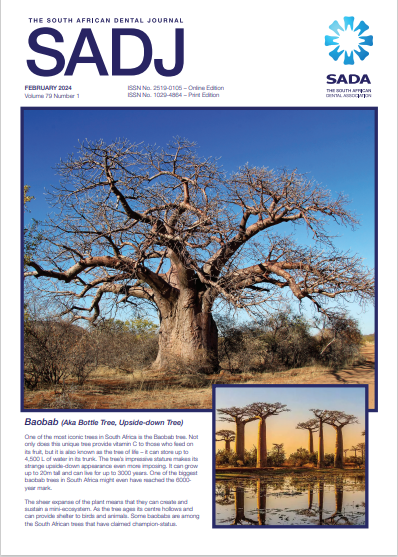MAXILLOFACIAL RADIOLOGY Double type III dens invaginatus
DOI:
https://doi.org/10.17159/sadj.v79i01.18042Keywords:
odontogenic keratocyst, periapical radiolucency, co-morbiditiesAbstract
A 27-year-old male patient presented with a six-month history of swelling involving the left posterior mandible. The patient’s medical history revealed no co-morbidities and the dental history was non-contributory. Extra-orally, there was a localised hard bony swelling involving the left posterior mandible. Intra-oral examination revealed a full complement of teeth with the left maxillary lateral incisor crown appearing malformed and a retained left maxillary deciduous canine. A panoramic radiograph revealed a well-defined, multilocular radiolucency with scalloped inferior borders in the left posterior mandible associated with the fi rst to third molars
(Figure 1). On further examination, a periapical was taken and revealed that the left maxillary lateral incisor appeared malformed with a periapical radiolucency (Figure 2). The periapical radiograph confi rmed the presence of a double dens invaginatus on the mesial and distal aspects. The patient was referred for an incisional biopsy of the lesion in the left posterior mandible, which was subsequently
diagnosed as an inflamed odontogenic keratocyst and managed accordingly.
Downloads
References
Buchanan GD, Gamieldien MY, Fabris-Rotelli I, van Schoor A, Uys A. Root and canal morphology of the permanent anterior dentition in a Black South African population using cone-beam computed tomography and two classification systems. J Oral Sci. 2022;64(3):22-0027 DOI: https://doi.org/10.2334/josnusd.22-0027
Hunter KD, Brierley D. Pathology of the teeth: an update. Diagnostic Histopathol [Internet]. 2017;23(6):275-83. Available from: http://dx.doi.org/10.1016/j.mpdhp.2017.04.005 DOI: https://doi.org/10.1016/j.mpdhp.2017.04.005
Oéhlers FA. Dens invaginatus (dilated composite odontome). I. Variations of the invagination process and associated anterior crown forms. Oral Surg Oral Med Oral Pathol. 1957;10:1204-18 DOI: https://doi.org/10.1016/0030-4220(57)90077-4
Bhatt AP, Dholakia HM. Radicular variety of double dens invaginatus. Oral Surgery, Oral Med Oral Pathol. 1975;39(2):284-7 DOI: https://doi.org/10.1016/0030-4220(75)90230-3
Kirziòglu Z, Ceyhan D. The prevalence of anterior teeth with dens invaginatus in the western mediterranean region of Turkey. Int Endod J. 2009;42(8):727-34 DOI: https://doi.org/10.1111/j.1365-2591.2009.01579.x
Kronfeld R. Dens in dente. J Dent Res. 1934;14:49-65 DOI: https://doi.org/10.1177/00220345340140010801
Swanson WF, McCarthy FM. Bilateral Dens in dente. J Dent Res. 1947;26:167-71 DOI: https://doi.org/10.1177/00220345470260020801
Nu Nu Lwin H, Phyo Kyaw P, Wai Yan Myint Thu S. Coexistence of true talon cusp and double dens invaginatus in a single tooth: a rare case report and review of the literature. Clin Case Reports. 2017;5(12):2017-21 DOI: https://doi.org/10.1002/ccr3.1252
Verma P, Sachdeva S, Mehta M, Goyal S. Bilateral double dens invaginatus in multituberculated maxillary central incisors with impacted supernumerary teeth: A rare case. J Indian Acad Oral Med Radiol. 2015;27(1):127 DOI: https://doi.org/10.4103/0972-1363.167132
Babu NSV, Rao K, Milind LS. Rare Case of Double Dens Invaginatus in a Supernumerary Tooth - An Unusual Case Report. 2014;1(5):48-50
da Silva EJNL, Oliveira SG, Zaia AA. Management of a rare case of Class II double dens invaginatus in a maxillary lateral incisor. Dent Press Endod. 2014;4(2):79-82 DOI: https://doi.org/10.14436/2178-3713.4.2.079-082.oar
Zengin AZ, Sumer AP, Celenk P. Double dens invaginatus: report of three cases. Eur J Dent. 2009;3(1):67-70 DOI: https://doi.org/10.1055/s-0039-1697408
Koteeswaran, Vishnupriya Chandrasekaran, S Natanasabapathy V. Endodontic management of double dens invaginatus in maxillary central incisor. J Conserv Dent. 2018;21(5):574-7 DOI: https://doi.org/10.4103/JCD.JCD_93_18
Ulmansky M, Hjørting-Hansen E, Praetorius F, Haque MF. Benign cementoblastoma. Oral Surgery, Oral Med Oral Pathol. 1994 Jan;77(1):48-55 DOI: https://doi.org/10.1016/S0030-4220(06)80106-4
Vajrabhaya L ongthong. Nonsurgical endodontic treatment of a tooth with double dens in dente. J Endod. 1989;15(7):323-5 DOI: https://doi.org/10.1016/S0099-2399(89)80056-1
Zoya A, Ali S, Alam S, Tewari RK, Mishra SK, Kumar A, et al. Double dens invaginatus with multiple canals in a maxillary central incisor: Retreatment and managing complications. J Endod [Internet]. 2015;41(11):1927-32. Available from: http://dx.doi.org/10.1016/j.joen.2015.08.017 DOI: https://doi.org/10.1016/j.joen.2015.08.017
John H, Padmashree S, Jayalekshmy R. Cone Beam Computed Tomography Aided Diagnosis of Double Dens Invaginatus in a Fused Supernumerary Tooth and Maxillary Central Incisor : A Case Report. IJSS Case Reports. 2015;2(5):24-7
Ridell K, Mejàre I, Matsson L. Dens invaginatus: A retrospective study of prophylactic invagination treatment. Int J Paediatr Dent. 2001;11(2):92-7. DOI: https://doi.org/10.1046/j.1365-263x.2001.00234.x
Fregnani ER, Spinola LFB, Sônego JRO, Bueno CES, De Martin AS. Complex endodontic treatment of an immature type III dens invaginatus. A case report. Int Endod J. 2008;41(10):913-9 DOI: https://doi.org/10.1111/j.1365-2591.2008.01414.x
Downloads
Published
Issue
Section
License

This work is licensed under a Creative Commons Attribution-NonCommercial 4.0 International License.





.png)